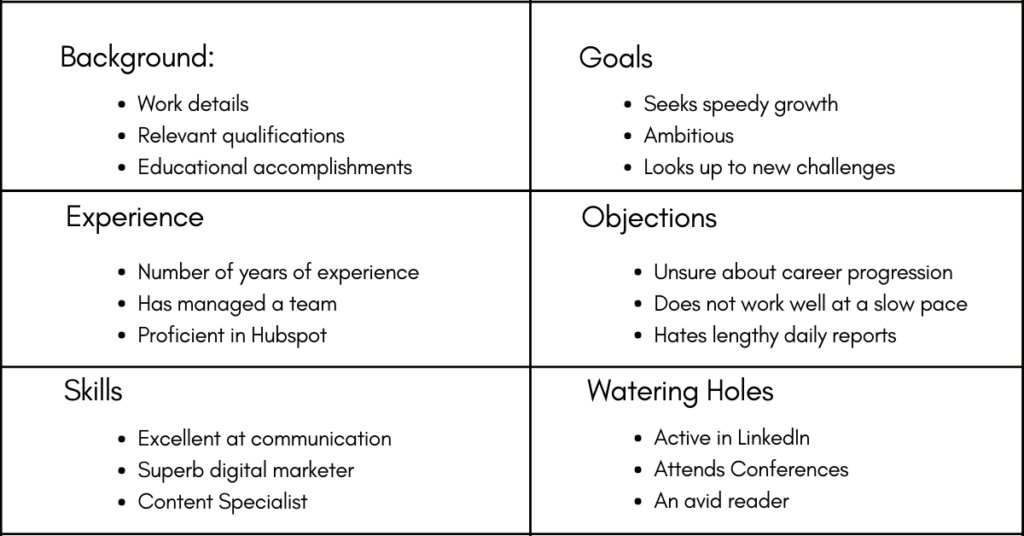
A bad hire or poor hire are two phrases no recruiter ever wants to hear. The implications of a bad hire are multifold. Zappos CEO Tony Shieh once estimated that bad hires had cost the company “well over $100 million.”
While that could be a cumulative loss and a little exaggerated, according to the U.S. Department of Labor, the price of a bad hire is at least 30 percent of the employee’s first-year earnings. How about the loss of time? After a bad hire has been let go, a new search for a replacement begins anew. According to a CareerBuilder survey, 75 percent of employers said they had hired the wrong person for a position, resulting in an average loss of $17,000 per hire.
A bad hire is a threat to a business, both in the short and long term. If HR processes are not systematically designed and followed, there is no guarantee that recruiters will improve on their performance. Using Candidate Persona in your hiring process can make you a better judge in hiring the right candidate. Let us first define what a candidate persona is:
“Candidate persona is a fictional representation of your ideal candidate, based on research, data, and interviews-”
Let’s make a candidate persona as an exercise. There are six critical elements to be considered when you build a candidate persona, namely:
- Background
- Goals
- Experience
- Objections
- Skills
- Watering Holes.
Let’s call our persona Jennifer and fill in details about her. We’ll discuss later how these details are obtained and are not random.

The persona might seem generic and evident at first glance. But an ideal persona is created with a lot of data sets and interviews from multiple channels. These are the few ways in which a right candidate persona could be created:
Hiring Managers Interviews:
Conducting one on one meetings with hiring managers is the first step. Ask them about their experience with the high performers for specific roles. Ask them in detail about the candidates based on the above table. Formulate your questions in such a way that the responses are directly impacting your persona table. For example, you could ask them about the candidate’s skills or his social behavior. Straying in questioning negatively affects the accuracy of the persona. Prepare the questions very well and stick to them.
Professional Network Interviews:
Using professional networks to create candidate persona is also useful. You could shortlist profiles of those that are like the candidate persona you are creating. You could connect with them and arrange for a call. If a phone call is unfeasible, you could send them a questionnaire. Make sure you ask them about their current roles and experience. Tightly align your candidate persona framework with the questions you ask or the questionnaire you send. It will help you with accurate responses.
Current Employees
There will be employees in your own company that are productive at roles for which you’re creating candidate persona. Interview them, the more, the better. Current Employee Focus Group can also help you in validating the information gathered by the above two activities. By far, this is the group you can more comprehensively engage with. Ask them what works, what doesn’t, and what is missing. These employees can give you answers based on their experiences within the cultural framework of your organization.
How Candidate Persona helps in good hiring
- Reduces the initial screening process: With the help of Candidate Persona, you will have a good idea of who isn’t a good fit for a specific role. For example, the goals or working methodology of a candidate could be very different than that of the persona. You could save your time in not proceeding further with candidates that contradict the persona in multiple ways.
- Helps you in writing compelling job descriptions: Job descriptions are dry. There is very little apart from skills, experience, and expectations in them. Recruiters could create elaborate job descriptions that are compelling. Ideal candidates should get immediately attracted to the job role. A candidate persona will help you write attractive job descriptions that differentiate your job role from others.
- Personalized Candidate Experience: Candidate experience is the top priority of recruiters today. Consider this statistic: 72% of the hiring managers say they provide clear job descriptions, while only 36% of candidates say the same. Recruiters need to deliver personalized candidate experience, which starts with knowing the ideal candidate inside-out. Candidate Persona helps you with that. It’s the starting point of the candidate experience.
The Role of Technology
-
Choosing the right Applicant Tracking System is essential to your recruitment success. Candidate Persona is the starting point of recruitment. To deliver end to end candidate experience, recruiters need to automate onboarding and enable collaboration between teams. At Vultus, we equip HR Managers with tools that bring the power of recruitment in one place. Our exceptional User Interface helps you design Candidate Persona with ease. You will be able to deliver a memorable candidate experience using Vultus Recruit and Vultus Connect.
To know more about Candidate Experience, you can refer to this blog:
https://www.vultus.com/what-is-candidate-experience-and-how-to-improve-it-effectively/
To receive and stay updated about related content:





